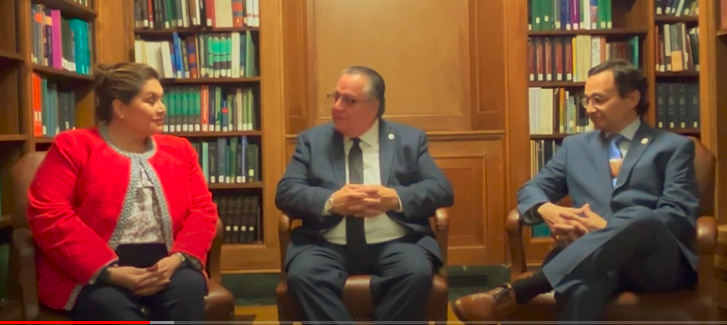
- Details
- By Elyse Wild
The Cherokee Nation leaders offered reflections on Congress’ Nov. 16 hearing on legal and procedural factors in seating a Cherokee Nation Delegate.
The 1835 New Echota Treaty signed by the United States and the Cherokee Tribe that led up to the Trail of Tears states that the Cherokee “shall be entitled to a delegate in the House of Representatives of the United States whenever Congress shall make provision for the same.”
Hoskin said that he felt optimistic after the hearing, where he was able to answer questions ranging from the mechanics of seating a new delegate to why it’s taken the nation 187 years to ask to seat their delegate before members of Congress.
“[There are a] mix of Republicans and Democrats on the Rules Committee, [and] all of their questions were really oriented not towards, should this be stopped, but ‘How does this get implemented?’ Hoskin said. “I think by the end, there really was this bipartisan consensus that it’s not a question of if we do this; it’s a question of how we do it.”
Teehee comes to her nomination with experience in federal government relations. She previously served President Barack Obama as the first-ever Senior Policy Advisor for Native American Affairs in the White House Domestic Policy Council for three years. Additionally, she served as Senior Advisor to the U.S. House of Representatives Native American Caucus Co-Chair, Rep. Dale Kildee (D-MI.
Teehee told Native News Online that her experience with the United States House of Representatives will help her serve as a delegate, given her background in the specific processes, and will bolster representation for Indigenous peoples all over the country.
“For far too long, Indian tribes in this country have only had a handful of champions,” Teehee said. “They bear the burden of all the federally recognized tribes in this country in getting their issues addressed to Congress. We have in my lifetime—not to be dramatic about it—the most Natives in Congress in a single period of time. Representation matters, so it’s important to add a seat at the table and have that seat be filled by a treaty-based delegate so that we can have a seat at the table whenever formulating laws that impact, uniquely, us.”
One specific issue in front of Congress currently is advanced appropriations.
Unlike the Veterans Association, Medicare, and Medicaid, the Indian Health Service (IHS) is the only major federal healthcare program subject to annual appropriations, making tribal citizens vulnerable to slashed or delayed funding in instances of drawn-out budget negotiations or government shutdowns.
Want more Native News? Get the free daily newsletter today.
IHS is funded through annual appropriations acts and — if regular appropriations are not enacted before the start of the fiscal year on Oct. 1 — interim funding is provided by a continuing resolution.
Receiving funds under a continuing resolution limits the activities that IHS can undertake, in part because IHS can only expend funds for the duration of a continuing resolution, which prohibits the agency from making longer-term, potentially cost-saving purchases, according to the Congressional Research Service. IHS has been funding through continuing resolutions at some point during nearly each of the past 20 fiscal years.
“We are in an environment where Congress is routinely passing their appropriations funding bills by continuing resolution, and we’re always on the cusp of government shutdowns,” Teehee told Native News Online. “That’s being discussed now. We’ve got one continuing resolution that’s expiring next month and what that means for tribes is we have to make contingency plans just in case there’s a government shutdown. That kind of planning is disruptive of tribal governments that have few enough resources as it is to tap to then try to decide how we’re going to keep our nurses employed, doctors employed, our law enforcement employed. Advance appropriations would eliminate that worry and allow tribes to have an additional fiscal year of funding.”
Teehee said there’s bipartisan support to at least have advanced appropriations in the Indian Health Service System. “Really, it needs to be expanded,” she said. “But we’ll take that to start.”
Hoskin agreed.
“The fact that when these government shutdowns happen, and they do happen from time to time, the rest of federal health care… continues on because the nation understands it’s a priority,” he said. “My goodness, Indian health care ought to be at the same level.”
More Stories Like This
50 Years of Self-Determination: How a Landmark Act Empowered Tribal Sovereignty and Transformed Federal-Tribal RelationsSRMT Child Support Enforcement Unit Delivers Holiday Food Boxes to Families
The Shinnecock Nation Fights State of New York Over Signs and Sovereignty
Navajo Nation Council Members Attend 2025 Diné Action Plan Winter Gathering
Ute Tribe Files Federal Lawsuit Challenging Colorado Parks legislation
Help us defend tribal sovereignty.
At Native News Online, our mission is rooted in telling the stories that strengthen sovereignty and uplift Indigenous voices — not just at year’s end, but every single day.
Because of your generosity last year, we were able to keep our reporters on the ground in tribal communities, at national gatherings and in the halls of Congress — covering the issues that matter most to Indian Country: sovereignty, culture, education, health and economic opportunity.
That support sustained us through a tough year in 2025. Now, as we look to the year ahead, we need your help right now to ensure warrior journalism remains strong — reporting that defends tribal sovereignty, amplifies Native truth, and holds power accountable.
 The stakes couldn't be higher. Your support keeps Native voices heard, Native stories told and Native sovereignty defended.
The stakes couldn't be higher. Your support keeps Native voices heard, Native stories told and Native sovereignty defended.
Stand with Warrior Journalism today.
Levi Rickert (Potawatomi), Editor & Publisher

